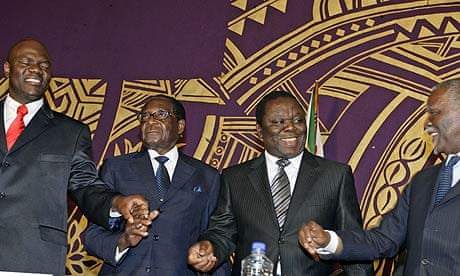Zimbabwe's opposition leader, Morgan Tsvangirai, today threatened to pull out of a power-sharing deal after the country's president, Robert Mugabe, unilaterally announced he had taken control of all major cabinet posts, including those responsible for the military and police.
South Africa's former president, Thabo Mbeki, is expected in Harare tomorrow to try and rescue the agreement he brokered, under which Tsvangirai is appointed prime minister and Mugabe remains president but with far few powers than before.
Tsvangirai told a rally in Harare today that he would not be pressured by Mugabe into joining an administration dominated by the president's Zanu-PF party when the opposition Movement for Democratic Change (MDC) won the last reputable elections in March.
"If they do it that way, we have no right to be part of such an arrangement," said Tsvangirai. "The people have suffered. But if it means suffering the more in order for them to get what is at stake, then so be it. We will renegotiate until an agreement is reached but that does not mean we will compromise for the sake of it."
Mugabe announced the appointment of new cabinet posts this weekend, allocating his party jurisdiction over the various security and intelligence forces as well as the justice portfolio and the information ministry, which has control over Zimbabwe's highly partisan pro-Mugabe state newspapers and broadcasters.
The MDC described the move as a "giant act of madness which puts the whole deal into jeopardy" and as a ploy to pre-empt Mbeki's visit to unblock the logjam over the distribution of ministries.
"The elite in Zanu-PF is not interested in addressing the current challenges in the country. Instead, they are obsessed with power retention at all costs," Tsvangirai's party said.
The MDC says it will agree to Zanu-PF having authority over the military but that Tsvangirai must control home affairs, which oversees the police, and the justice ministry. That is important to Tsvangirai to ensure that Zanu-PF does not repeat its violent campaign at the next election.
Mugabe's move is a demonstration of his power to obstruct the political deal he described as "humiliating" after he was forced to sign it last month. But the Zimbabwean president's overall position remains weak.
There will be no foreign aid to rescue an economy collapsing under hyperinflation - officially put at 231 million percent but which in reality runs into the trillions - without Tsvangirai wielding real authority at the head of a genuine power sharing government.
Mugabe only signed the political agreement with the opposition because his administration has no solutions to the economic crisis. Thus, while he can block implementation of the deal, and keep control of the government, he will be left facing even deeper problems than when he was forced into the deal.
Neither can Mugabe count on Mbeki to protect him after a change of administration in South Africa. Although Mbeki remains the mediator, South Africa's new president, Kgalema Montlanthe, and those around him are hostile to Mugabe and there is a growing mood inside the new government to confront Zimbabwe's leader.
